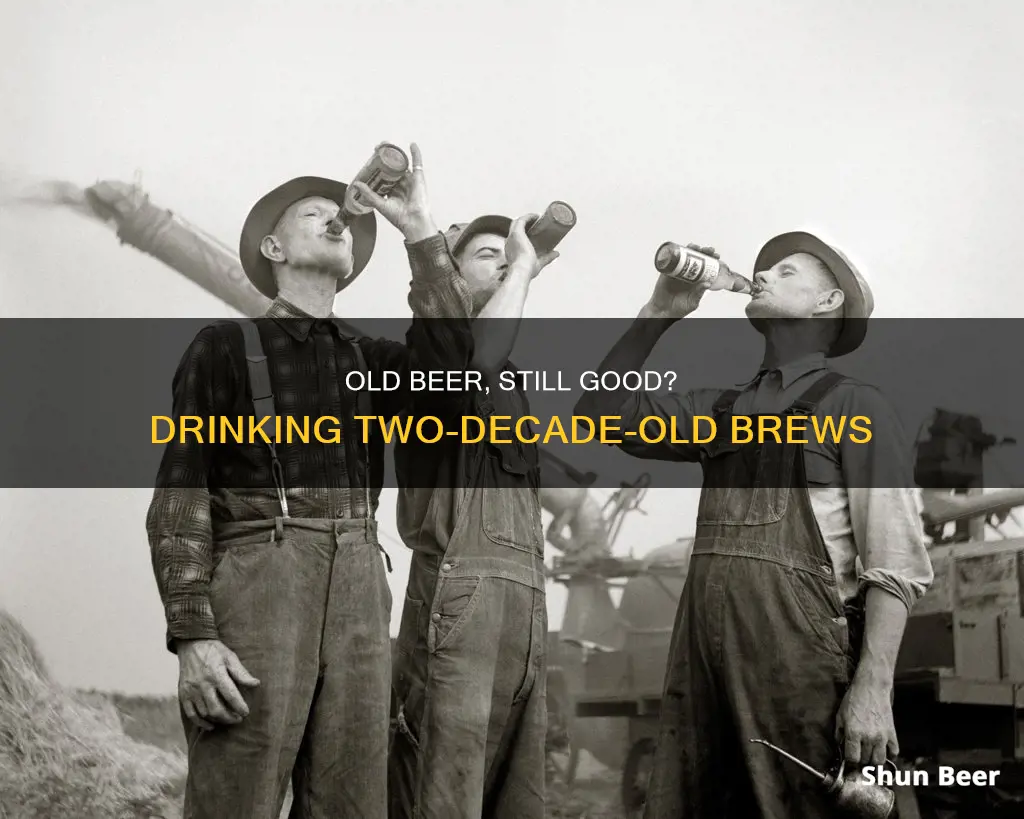
Drinking a 20-year-old beer is unlikely to be harmful to your health, but it is also unlikely to be a pleasant experience. While some beers can be aged and will improve with time, most beers are designed to be consumed fresh. The longer a beer is left, the more oxidised it will become, and this will affect its taste. Beers with higher alcohol content will generally keep for longer, as the more robust flavours can mask any ongoing oxidation.
| Characteristics | Values |
|---|---|
| Safety | Drinking a 20-year-old beer is safe and will not cause sickness. |
| Taste | The beer will likely taste unpleasant, stale, and/or like cardboard, paper, or corn. |
| Appearance | The colour may change, and chunks may appear in unfiltered beer. |
| Smell | The beer may smell like vinegar, burnt plastic, or cat pee. |
What You'll Learn

Is 20-year-old beer safe to drink?
It is generally safe to drink beer that is 20 years old. However, it is important to note that the taste and quality of the beer will have significantly deteriorated over time. Beer is not meant to be aged like wine, and even those with high alcohol content will not taste good after 20 years.
Factors Affecting Beer Quality Over Time
Several factors affect how well beer ages over time. These include:
- Alcohol content: Beers with higher alcohol content tend to age better than those with lower alcohol content. A minimum of 8% ABV is recommended for beers intended for cellaring.
- Color: Darker beers tend to age better than lighter beers.
- Acidity: Beers with higher acidity, often introduced through bacteria, can age better.
- Wild yeast: The presence of wild yeast strains, such as Brettanomyces, can improve the ageing potential of beer.
- Storage conditions: Beer should be stored in a dark place with a relatively stable temperature, preferably on the cooler side.
Taste and Quality of Aged Beer
Even when stored properly, 20-year-old beer will not taste good. The longer beer ages, the more oxidized it becomes, resulting in cardboard-like or vinegary flavours. Additionally, the appearance, aroma, and carbonation of the beer may also be affected, resulting in a less appealing beverage overall.
Health Concerns
While drinking very old beer may not cause any severe health issues, some individuals have reported feeling more intoxicated after consuming aged beers. Therefore, it is important to drink aged beers in moderation and be aware of the potential for increased intoxication.
Beer's Blood-Thinning Effect: Myth or Reality?
You may want to see also

What does 20-year-old beer taste like?
The taste of 20-year-old beer depends on a variety of factors, including the type of beer, how it was stored, and whether it was properly sealed.
Firstly, the type of beer is important. Beers with higher alcohol content, darker colours, and more acidity tend to age better. Wild yeast in the beer can also lead to favourable flavour profiles over time. Examples of beers that tend to age well include lambics, gueuzes, Flemish ales, dubbels, quads, stouts, Scotch ales, and barleywines. On the other hand, low-gravity, pale, and light beers do not age as well and will start tasting stale much faster.
Secondly, the way the beer was stored also affects its taste over time. Beer should be stored in a dark place with a stable temperature, ideally on the cooler side. Green bottles do a poor job of blocking light, which can lead to a "skunky" taste. Brown bottles filter light better, and opaque containers are the most effective at blocking light.
Lastly, proper sealing is crucial to preserving the taste of beer over time. Beers with regular bottle caps should be stored upright, while those with corks should be stored horizontally, similar to wine.
Even when taking all these factors into account, there is still a lot of variability in the taste of aged beer. Some people enjoy the complex flavours that develop over time, while others find that it just tastes stale or "off." In general, the longer beer ages, the higher the chance that it will taste unpleasant.
In summary, while 20-year-old beer is unlikely to be harmful to consume, its taste will depend on a variety of factors and may be hit or miss.
Beer Tower Tech: Glycol Cooling Explained
You may want to see also

How long can beer be safely stored?
Beer can be safely stored for a few years, but its flavour will deteriorate over time.
Storing Beer
Beer should be stored in a cool, dark place, away from direct sunlight and heat sources. Beer containers should be kept in an upright position to limit air contact. The optimal temperature for storing beer is between 10°C and 13°C (50°F and 55°F).
Beer Shelf Life
The shelf life of beer depends on various factors, including packaging type, storage conditions, and beer style. Canned beer typically has a shelf life of around one to two years, while bottled beer can last up to six months to two years, depending on storage conditions. Beer stored in a refrigerator can last up to two or three years beyond its expiration date.
Factors Affecting Shelf Life
Beer with low alcohol content has a shorter shelf life of up to six months, while beer with high alcohol content can remain viable for up to one to two years, especially if it is unopened. Lighter beers, such as hoppy beers, lagers, and ales, typically have a shorter shelf life, while darker or aged beers, like stouts, porters, barley wines, and Belgian ales, can last longer.
Signs of Spoiled Beer
Common indicators of spoiled beer include off flavours, a stale taste, a skunk-like smell, and a cloudy appearance. Spoilage can be caused by oxidation, bacterial contamination, or improper storage.
Drinking Old Beer
While drinking expired or old beer is generally safe, it may not taste pleasant due to exposure to light and air. However, if the beer does not show any signs of spoilage, it can be consumed without serious health risks.
The Magic Behind Beer Filtration: Using Sheet Filters
You may want to see also

What are the best beers to age?
While fresh beer is generally better, some beers can be aged for months or even years. Beers with a high alcohol content, usually between 7% and 11% ABV, tend to respond well to ageing. Strong ales, barley wines, Belgian beers, stouts, old ales, lambics, gueuzes, and Scottish exports are some examples of beers that can be aged. Beers with wild yeast and bacteria, such as brettanomyces, lactobacillus, and pediococcus, can also improve with age.
When ageing beer, it is important to store it in a dark, cool place, such as a basement or garage, with minimal light exposure to avoid off-flavours. Consistency of temperature is also key, with 55°F (12.7°C) being a good rule of thumb. Additionally, beers should be stored upright and away from any heat sources.
It is worth noting that ageing beer is always a slight gamble, as some beers may not improve or may even spoil. Therefore, it is recommended to taste the beer periodically to monitor its evolution.
The Magic of Beer Randall: Infusing Beers with Flavors
You may want to see also

How do you age beer?
It is possible to drink a 20-year-old beer. While it is unlikely to be harmful to your health, it will probably taste unpleasant. One source states that "the alcohol in beer is enough to kill off 'bugs' that would cause illness in humans". However, another source notes that "even if it won't make you sick, it won't taste good either".
If you are interested in ageing beer, there are some important factors to consider. Firstly, the type of beer matters. High-gravity beers, such as barley wines or imperial stouts, benefit from ageing and acquire richer flavours as they slowly oxidise. On the other hand, low-gravity beers begin to taste stale much more quickly, and may last for only up to 6 months if kept refrigerated. Belgian styles, like lambics, also age well as the wild yeasts and bacteria continue to grow. However, even these have a limit, and will eventually turn stale.
Secondly, light is the "real enemy" when it comes to ageing beer. Clear glass bottles provide no protection, and beer left in the sun for even a day may be affected. Green glass provides some protection, but brown glass is the best option, blocking around 90% of light. Opaque materials are the most effective at blocking light.
The Magic of Beer Fob: How It Works
You may want to see also
Frequently asked questions
Yes, it is safe to drink beer that is 20 years old. Canned or bottled beers are already fully fermented, so no harmful pathogens will grow inside. However, the taste will be affected.
Beer kept in a pantry will taste good for up to nine months, and a beer in the fridge can last up to two years.
Beers with higher alcohol content keep longer. Beers with regular bottle caps should be stored upright, and those with corks should be stored horizontally.







